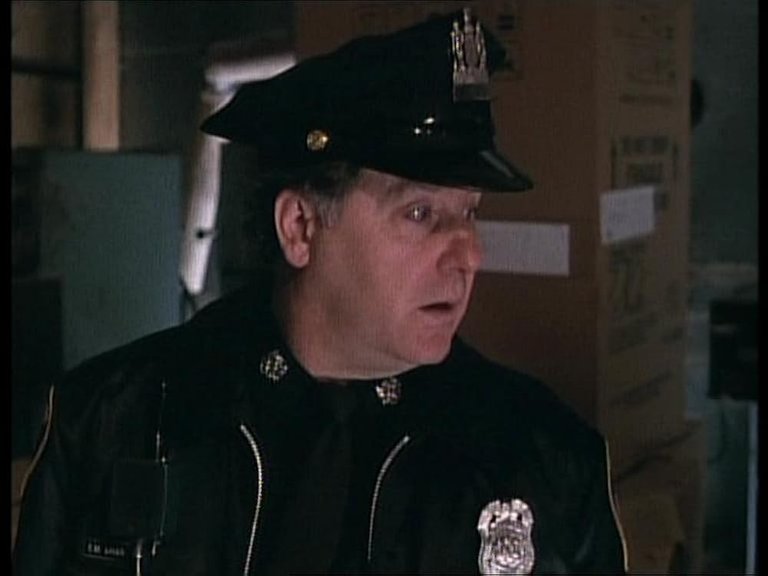Television Review: Scene of the Crime (Homicide: Life on the Streets, S4X18, 1996)

Scene of the Crime (S04E18)
Airdate: 12 April 1996
Written by: Anya Epstein & David Simon
Directed by: Kathy Bates
Running Time: 47 minutes
Homicide: Life on the Street earned its reputation for unflinching realism through its unapologetic portrayal of Baltimore’s urban struggles, particularly its incisive examination of racial tensions and their political ramifications. Among the series’ most explicit explorations of these themes is Season 4’s Scene of the Crime, an episode that confronts the fraught interplay between race, community control, and law enforcement with stark clarity.
The episode’s central narrative revolves around the murder of a young Black drug dealer, thrown from the roof of a housing complex. Detectives Kellerman (Reed Diamond) and Lewis (Clark Johnson) arrive to investigate but are met with hostility from residents, who view the police as antagonists. A near-riot is averted only by the intervention of Ishmael al-Hadj (Victor Williams), a leader of a Black Muslim group which provides security to the building and is being funded by a federal HUD grant. While Ishmael’s paramilitary force has reduced crime through community control, their methods—rooted in racial ideology—clash violently with the detectives.
The city’s administration, acutely sensitive to racial dynamics, removes Kellerman and Lewis from the case to appease the community. However, Lieutenant Giardello (Yaphet Kotto) orchestrates a strategic media leak to force the detectives’ reinstatement. Under pressure to retain their HUD funding, Ishmael reluctantly identifies the killer, though he secretly warns the suspect, who escapes. The group’s loss of federal support signals a return to lawlessness in the housing estate, underscoring the episode’s bleak commentary on short-term solutions to systemic issues.
A secondary storyline follows Patrolman Stuart Gharty (Peter Gerety), a veteran officer who faces disciplinary action after failing to intervene in a shootout between two young Black men. Responding to a call, Gharty witnesses the men firing at each other and chooses not to act, resulting in their deaths. Detectives Munch (Andre Braugher) and Russert (Joanne Whalley) question his inaction. While Munch is satisfied with the outcome—two fewer criminals on the streets—Russert initiates an inquiry, questioning Gharty’s refusal to call for backup.
Gharty defends his decision, arguing that intervention could have escalated the violence or endangered bystanders. To his credit, he harbours no resentment toward Russert, even after the inquiry clears him. This subplot highlights the ethical minefield faced by police officers daily: balancing duty with the potential consequences of action. Gerety’s restrained performance imbues Gharty with quiet humanity, making him a memorable figure who would later become a regular character in the series.
Co-written by David Simon, the episode reflects his deep understanding of Baltimore’s political landscape. The HUD-funded Black Muslim group mirrors Simon’s later The Wire experiments with alternative governance models, where conventional policing is replaced by paramilitary or community-led solutions. Kellerman’s observation that Ishmael’s crime reduction parallels Hitler’s authoritarian methods—both achieved through intimidation—adds a chilling layer of critique. The episode openly states that African Americans constitute the city’s majority, compelling administrations to prioritize racial demographics over systemic reform. This creates a cycle of stopgap measures that fail to address root causes, leaving communities vulnerable to recurring chaos.
The Gharty storyline exemplifies the moral ambiguity inherent in policing. Gerety’s portrayal of the conflicted officer is masterful, conveying both his weariness and ethical resolve. His argument—that intervention might have worsened the situation—resonates as a valid critique of policing’s limitations. Gerety’s nuanced performance not only elevates this subplot but also positions him as a standout character actor, a role he would further refine in later seasons of the series and beyond.
While Scene of the Crime is a compelling exploration of its themes, it falls short of the series’ peak episodes due to an unnecessary subplot involving Detective Munch’s futile attempts to reconnect with Bollander, despite character being previously written out of the show. This thread—a relic of earlier seasons—feels redundant and detracts from the episode’s sharper narratives, serving as a distraction for viewers aware of Ned Beatty’s departure.
Scene of the Crime is a piercing examination of racial politics and police ethics, anchored by Simon’s incisive writing and Gerety’s standout performance. The episode’s exploration of HUD-funded community control and its flawed outcomes mirrors The Wire’s broader critique of institutional failure, while Gharty’s storyline underscores the human dimension of law enforcement’s ethical quandaries. Though marred by a superfluous subplot, the episode remains a testament to Homicide’s commitment to unvarnished storytelling, offering a bleak yet insightful portrait of a city fractured by race and power. For all its flaws, it stands as a compelling chapter in the series’ legacy, reminding viewers that solutions to urban decay often come at a cost—and rarely last.
RATING: 7/10 (+++)
Blog in Croatian https://draxblog.com
Blog in English https://draxreview.wordpress.com/
InLeo blog https://inleo.io/@drax.leo
Hiveonboard: https://hiveonboard.com?ref=drax
Rising Star game: https://www.risingstargame.com?referrer=drax
1Inch: https://1inch.exchange/#/r/0x83823d8CCB74F828148258BB4457642124b1328e
BTC donations: 1EWxiMiP6iiG9rger3NuUSd6HByaxQWafG
ETH donations: 0xB305F144323b99e6f8b1d66f5D7DE78B498C32A7
BCH donations: qpvxw0jax79lhmvlgcldkzpqanf03r9cjv8y6gtmk9